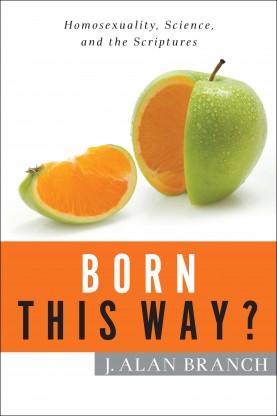A Brief Book Summary from Books At a Glance
About the Author
Alan Branch, Ph.D. (Southeastern Baptist Theological Seminary), serves as Professor of Christian Ethics at Midwestern Baptist Theological Seminary in Kansas City, MO, since 2001. He also currently serves as a Research fellow in Christian Ethics for the Ethics and Religious Liberty Commission (ERLC) of the Southern Baptist Convention (SBC). He has published other articles on topics within ethics.
Introduction
In this book Branch asks and answers the following question: are homosexuals “born this way?” That is, when people are born, are they born homosexuals? Many people claim they are. In fact, some scientific research claims that people may be born that way. But, for many people who read this book, they have little to no background in science. Branch, however, explains the research in a way that allows people without a background in science to understand the research and whether or not it can reliably be tied to the born-this-way arguments. Furthermore, what should Christians thinks about this claim, these specific scientific issues, and how shall they respond with a Christian worldview? Branch addresses each of these questions throughout this book.
Table of Contents
Acknowledgements
Introduction
Chapter 1 Sigmund Freud and Homosexuality
Chapter 2 Alfred Kinsey and Homosexuality
Chapter 3 The American Psychiatric Association and Homosexuality
Chapter 4 Brain Plasticity and Homosexuality
Chapter 5 Homosexuality and Prenatal Hormones
Chapter 6 Heterosexual and Homosexual Brain Differences
Chapter 7 Homosexuality and Twin Studies
Chapter 8 Homosexuality and DNA Research
Chapter 9 Homosexuality and Other Factors
Chapter 10 “I Can’t Change, Even If I Wanted To”
Chapter 11 Born-This-Way Arguments and Christian Ethics
Chapter 1: Sigmund Freud and Homosexuality
If Sigmund Freud is remembered for anything, it will likely always be his psychological claims about human sexuality. Branch provides a brief introduction to Freud’s claims on human sexuality. Branch, however, focuses specifically on Freud’s claims about homosexuality. He suggested there are three categories of homosexuals. First, there are absolute homosexuals who desire only people of the same sex; second, there are “amphigenic,” or bixsexuals; third, there are contingent homosexuals who normally choose someone of the opposite sex, but can still find sexual fulfillment from same-sex interaction. As to how people homosexuals, Freud developed four theories. First, he believed that young boys might maintain their unconscious bond with their mothers and, thus, choose other boys as their object of sexual desire. This point, of course, is based on Freud’s psychological idea that boys have their mothers as an object of their affection, and even have some sort of competition with their fathers for their mothers. This theory is known as the Oedipus complex. This theory arises from a situation in which the mother may be overly attentive. The second theory revolves around two ideas from psychoanalysis: the Oedipus complex and castration anxiety. Castration anxiety refers to Freud’s idea that when boys discover that girls do not have penises that they think girls are boys who have been castrated. This theory claims that sometimes boys are repulsed by the lack of male genitalia choose a feminine looking boy instead. The third theory is an inverted Oedipus complex; that is, the boy sexually desires his father instead of his mother. Usually in this case, then, the boy takes a feminine stance. The fourth theory is jealousy of siblings. Instead of being jealous with his father over his mother, the boy becomes jealous among his siblings. Branch sums up his survey of Freud’s comments on homosexuality by explaining how he makes conflicting statements about homosexuality, and has an overall negative light of it. Branch, then, critiques Freud’s views from a Christian worldview. Branch begins by recognizing several helpful elements from Freud’s perspective. Branch, then, levels three main critiques at Freud’s theory. First, Freud’s thoughts come from a worldview founded on atheistic assumptions. This point, however, does not mean that what Freud says is automatically wrong. Nevertheless, the origin of a belief matters when people remember that worldviews color everything one sees and thinks about. Second, Freud’s data is based on his subjective interpretations of his patient’s experience. Third, Freud possessed a distorted view of children’s sexuality.
Chapter 2: Alfred Kinsey and Homosexuality
After addressing some of the psychological arguments for homosexuality, Branch turns his attention to Alfred Kinsey, the father of the American Sexual Revolution. Kinsey and his research matter because his research from the 1940s and 1950s is still cited by born-this-way advocates. Kinsey grew up in the home of devoutly Christian parents. But, after his education at Harvard, his worldview changed; he became an evolutionary atheist. This worldview change impacted his research. He began his career and became a world-renowned wasp specialist. But, when he was asked to teach a course on marriage at Indiana University, his career and research interests turned an entirely different direction. He began to apply his “obsessive and taxonomic approach of research on wasps to the study of human sexuality” (18). He, then, began to conduct interviews of research participants regarding their sexual experiences. His research resulted into publication of at least two key books: Sexual Behavior in the Human Male (1948) and Sexual Behavior in the Human Female (1953).
As part of his research, he developed a scale to tabulate the data they collected:
0 – Exclusively heterosexual with no homosexual
1 – Predominantly heterosexual, only incidentally homosexual
2 – Predominantly heterosexual, but more than incidentally homosexual
3 – Equally heterosexual and homosexual
4 – Predominantly homosexual, but more than incidentally heterosexual
5 – Predominantly homosexual, but incidentally heterosexual
6 – Exclusively homosexual
Branch notes: “On this scale, six out of the possible seven scores could be interpreted. . .
[To continue reading this summary, please see below....]The remainder of this article is premium content. Become a member to continue reading.
Already have an account? Sign In
